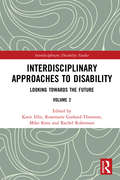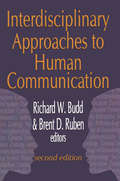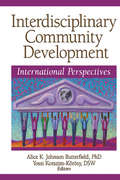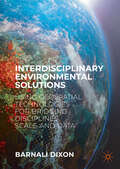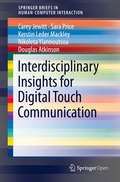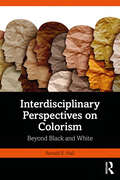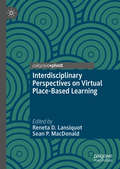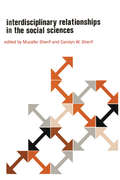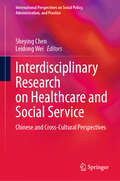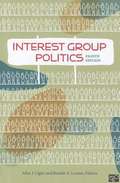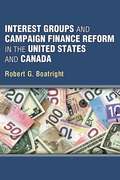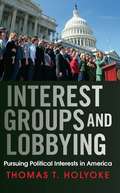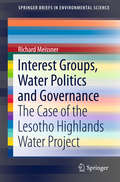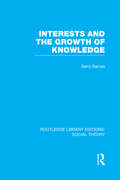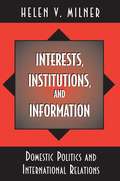- Table View
- List View
Interdisciplinary Approaches to Disability: Looking Towards the Future: Volume 2 (Interdisciplinary Disability Studies)
by Rosemarie Garland-Thomson Rachel Robertson Katie Ellis Mike KentHow can a deep engagement with disability studies change our understanding of sociology, literary studies, gender studies, aesthetics, bioethics, social work, law, education, or history? Interdisciplinary Approaches to Disability (the companion volume to Manifestos for the Future of Critical Disability Studies) identifies both the practical and theoretical implications of such an interdisciplinary dialogue and challenges people in disability studies as well as other disciplinary fields to critically reflect on their professional praxis in terms of theory, practice, and methods. Topics covered include interdisciplinary outlooks ranging from media studies, games studies, education, performance, history and curation through to theology and immunology. Perspectives are drawn from different regions from the European Union to the Global South with chapters that draw on a range of different national backgrounds. Our contributors who write as either disabled people or allies do not proceed from a singular approach to disability, often reflecting different or even opposing positions. The collection features contributions from both established and new voices in international disability studies outlining their own visions for the future of the field. Interdisciplinary Approaches to Disability will be of interest to all scholars and students working within the fields of disability studies, cultural studies, sociology, law history and education. The concerns raised here are further in Manifestos for the Future of Critical Disability Studies.
Interdisciplinary Approaches to Human Communication
by Richard W. BuddThis volume brings together diverse and divergent essays on communication as viewed by outstanding scholars in various disciplines. The authors review the mainstream of each approach to communication, sketch the dimensions of that concern, and discuss the problems and potential for future progress.Contents: Lee Thayer, "Communication: Sine Qua Non of the Behavioral Sciences"; Hubert Frings, "Zoology"; Alfred G. Smith, "Anthropology"; Richard W. Budd, "General Semantics"; Brent D. Ruben, "General System Theory"; Joseph M.R. Del-gado, "Neurophysiology"; Herbert Blumer, "Symbolic Interaction"; and Peter L. Berger, "Sociology of Knowledge."
Interdisciplinary Community Development: International Perspectives
by Alice K. Johnson Butterfield Yossi Korazim-KőrösyInterdisciplinary Community Development: International Perspectives is a unique look at the innovations in interdisciplinary community development around the world. International leaders in geography, public policy, administration, social work, education, and public health explore the latest research, programs, and approaches to promote strategies
Interdisciplinary Environmental Solutions: Using Geospatial Technologies for Bridging Disciplines, Scale and Data
by Barnali DixonThis textbook presents a clear and accessible argument for sustainable planning and development. The book discusses multiple environmental issues and examines how potential solutions can and should be addressed in the context of space and place. The book also offers an invaluable discussion on the need for a framework for system-based thinking where various disciplines should work together to find innovative solutions. Students are provided with an appreciation of the need for an interdisciplinary approach to these issues combined with an underlying sense of space, an appreciation of cultural diversity and differences, as well as associated insights into human relationships. These core attributes put space at the heart of environmental and natural resources management, in terms of policy, planning and on-the-ground initiatives.This book will be an invaluable reference for advanced undergraduate, graduate students and researchers working in the field looking for an accessible overview of this interdisciplinary approach to the topic.
Interdisciplinary Insights for Digital Touch Communication (Human–Computer Interaction Series)
by Carey Jewitt Sara Price Nikoleta Yiannoutsou Douglas Atkinson Kerstin Leder MackleyCommunication is increasingly moving beyond ‘ways of seeing’ to ‘ways of feeling’. This Open Access book provides social design insights and implications for HCI research and design exploring digitally mediated touch communication. It offers a socially orientated map to help navigate the complex social landscape of digitally mediated touch for communication: from everyday touch-screens, tangibles, wearables, haptics for virtual reality, to the tactile internet of skin. Drawing on literature reviews, new case-study vignettes, and exemplars of digital touch, the book examines the major social debates provoked by digital touch, and investigates social themes central to the communicative potential and societal consequences of digital touch: · Communication environments, capacities and practices · Norms associations and expectations · Presence, absence and connection · Social imaginaries of digital touch · Digital touch ethics and values The book concludes with a discussion of the significance of social understanding and methods in the context of Interdisciplinary collaborations to explore touch, towards the design of digital touch communication, ‘ways of feeling’, that are useable, appropriate, ethical and socially aware.
Interdisciplinary Perspectives on COVID-19 and the Caribbean, Volume 2: Society, Education and Human Behaviour
by Sherma Roberts Halimah A. F. DeShong Wendy C. Grenade Dwayne DevonishCaribbean countries have had to navigate multiple crises, which have tested their collective resolve through time. In this regard, the region’s landscape has been shaped by an interplay of vulnerability and resilience which has brought to the fore possibilities and contradictions. It is within this context that the effects of the COVID-19 pandemic must be considered. Interdisciplinary Perspectives on COVID-19 and the Caribbean, Volume 2: Society, Education and Human Behaviour provides a comprehensive, multi- and interdisciplinary assessment of the impact of the COVID-19 pandemic, using the Caribbean as the site of enquiry. The edited collection mobilises critical perspectives brought to bear on research produced within and beyond the boundaries and boundedness of conventional academic disciplinary divides, in response to the multi-dimensional crises of our time. This volume is divided into four (4) parts consisting of twenty-three (23) chapters and weaves together four broad thematic strands: COVID-19 and Caribbean Society; COVID-19 Religion and Rights; Psycho-social Impacts of COVID-19; and Education, Innovation, and Technology. Authors working within and across the human, social, physical and life sciences consider the myriad effects of the health crisis in the region, interrogating these experiences from the granular to macro level, utilising inter and multidisciplinary lenses. Collectively, the chapters which constitute Volume II expose the fault lines in Caribbean societies, which are deeply rooted in the region’s history and delineate the precise ways in which the pandemic has transformed lives and livelihoods in the region. The culmination of this collection offers a reimagining of our Caribbean contemporary futures in the hope of finding home-grown solutions, avenues and possibilities.
Interdisciplinary Perspectives on Colorism: Beyond Black and White
by Ronald E. HallThis timely and unique book explores the concept of colorism, which is discrimination based on the color of a person’s skin, in a world where arguably light skin is privileged over dark, and one’s wealth, health, and opportunities are impacted by skin color, sometimes irrespective of one’s racial background. In the context of our multi-cultural and increasingly global society, and the historical backdrop of slavery, the text takes a unique approach by moving from personal anecdotes to adopting a scientific perspective grounded in empirical evidence. Hall explores how skin color is a more effective framework for examining prejudice and discrimination, as racial identities become increasingly mixed due to inter-racial unions and immigration. He argues that racism as discrimination by race is contrived, polarizing, and non-quantifiable, and that it is often skin color that is used to "identify" race, often inaccurately. With skin color being a visual and physical characteristic, with race-based prejudices attached to it, the author shows how skin color can be a loaded identifier of value and identity. In a world where the objective measure of skin color crosses racial boundaries and where race will become increasingly indiscernible over time, the ultimate aim of this book is to prepare for the social future of mankind that has already begun to take shape. Split into three parts, examining historical, contemporary, and potential future perspectives on colorism, this is fascinating reading for students and academics in psychology, social work, education, criminal justice, and other social sciences. The text will also be useful for providing validation for including colorism into the public domain.
Interdisciplinary Perspectives on Colorism: Beyond Black and White
by Ronald E. HallThis timely and unique book explores the concept of colorism, which is discrimination based on the color of a person’s skin, in a world where arguably light skin is privileged over dark, and one’s wealth, health, and opportunities are impacted by skin color, sometimes irrespective of one’s racial background.In the context of our multi-cultural and increasingly global society, and the historical backdrop of slavery, the text takes a unique approach by moving from personal anecdotes to adopting a scientific perspective grounded in empirical evidence. Hall explores how skin color is a more effective framework for examining prejudice and discrimination, as racial identities become increasingly mixed due to inter-racial unions and immigration. He argues that racism as discrimination by race is contrived, polarizing, and non-quantifiable, and that it is often skin color that is used to "identify" race, often inaccurately. With skin color being a visual and physical characteristic, with race-based prejudices attached to it, the author shows how skin color can be a loaded identifier of value and identity. In a world where the objective measure of skin color crosses racial boundaries and where race will become increasingly indiscernible over time, the ultimate aim of this book is to prepare for the social future of mankind that has already begun to take shape. Split into three parts, examining historical, contemporary, and potential future perspectives on colorism, this is fascinating reading for students and academics in psychology, social work, education, criminal justice, and other social sciences. The text will also be useful for providing validation for including colorism into the public domain.
Interdisciplinary Perspectives on Covid-19 and the Caribbean, Volume 1: The State, Economy and Health
by Sherma Roberts Halimah A. F. DeShong Wendy C. Grenade Dwayne DevonishCaribbean countries have had to navigate multiple crises, which have tested their collective resolve through time. In this regard, the region’s landscape has been shaped by an interplay of vulnerability and resilience which has brought to the fore possibilities and contradictions. It is within this context that the effects of the COVID-19 pandemic must be considered. Interdisciplinary Perspectives on Covid-19 and the Caribbean, Volume 1: The State, Economy and Health provides a comprehensive, multi- and interdisciplinary assessment of the impact of the COVID-19 pandemic, using the Caribbean as the site of enquiry. The edited collection mobilises critical perspectives brought to bear on research produced within and beyond the boundaries and boundedness of conventional academic disciplinary divides, in response to the multi-dimensional crises of our time. The culmination of this collection offers a reimagining of our Caribbean contemporary futures in the hope of finding home-grown solutions, avenues and possibilities. This volume is divided into five (5) parts consisting of twenty-four (24) chapters and weaves together thematic strands that focus on governance, the macro and micro aspects of the economy, tourism and hospitality, business management and public health policy. Together, the chapters in this volume tell the story of the extent and effects of Caribbean governments’ response to the pandemic and the ways in which industries and organisations have had to pivot to survive and transform their management and operational practices.
Interdisciplinary Perspectives on Virtual Place-Based Learning
by Reneta D. Lansiquot Sean P. MacDonaldThis book explores how virtual place-based learning and research has been interpreted and incorporated into learning environments both within and across disciplinary perspectives. Contributing authors highlight the ways in which they have employed a variety of methodologies to engage students in the virtual exploration of place. In the process, they focus on the approaches they have used to bring the real world closer through virtual exploration. Chapters examine how the resources of the urban environment have been tapped to design student research projects within the context of an interdisciplinary course. In this way, authors highlight how virtual place-based learning has employed the tools of mapping and data visualization, information literacy, game design, digital storytelling, and the creation of non-fiction VR documentaries. This book makes a valuable contribution to the literature, offering a model of how the study of place can be employed in creative ways to enhance interdisciplinary learning.
Interdisciplinary Relationships in the Social Sciences
by Muzafer Sherif Carolyn Wood SherifInterdisciplinary collaboration in the social sciences is obviously essential to scientifi c progress, but discontent and practical diffi culties hinder collaboration in research and training. Many of the problems arise from the failure in the separate disciplines to understand the basis on which collaboration is necessary and possible. In an eff ort to shed light on the situation, these original essays by eminent scholars-economists, geographers, psychologists, political scientists,sociologists, anthropologists, and others-demonstrate eff ective means of achieving interdisciplinary coordination in studying human behavior and delineating promising areas-for cooperative research. Th e book provides a sophisticated guide to the nature of knowledge in social science as applied to its core disciplines.
Interdisciplinary Research on Healthcare and Social Service: Chinese and Cross-Cultural Perspectives (International Perspectives on Social Policy, Administration, and Practice)
by Sheying Chen Leidong WeiResearch on healthcare and social service including professional social work is inherently an international subject. Each nation has a story of coping with the recent pandemic in the context of its political economy and cultural-historical settings. A study of various (especially non-Western) cases is essential to an adequate understanding of the undertaking. China is undoubtedly an important case with one of the largest populations on earth. It’s unique in view of so-called Chinese characteristics/style/model, sometimes fundamentally different from Western societies. Any lessons learned from the Chinese experiences would help with a better understanding of healthcare and social welfare provisions on a global scale. The book is written by a scholarly team who are experts in healthcare, social work, and related fields. Its primary audiences are scholars and students in Health/Mental Health, Social Work/Welfare/Services, Public/Social Policy, Philanthropy and Nonprofit Organizations, International/Cross-Cultural Studies, and Chinese/China research.
Interdisciplinary and Global Perspectives on Intersex
by Megan WalkerThis edited collection interrogates how social and cultural representations of individuals with intersex variations impact how they are understood and treated from legal and medical perspectives across the world. Contributors consider how novelists, filmmakers, artists, and medical professionals have represented people with intersex variations, and highlight the importance of ethical representation and autonomy to encourage wider cultural and medical knowledge of intersex variations as a naturally occurring phenomenon. The text also examines the ways in which individuals with intersex variations are represented and viewed in India, Italy, Pakistan and Israel, as well as how this impacts decision making for the individuals, families and medical providers. This book argues that reactions to intersex variations will not change unless they are no longer presented as treatable disorders. It positions representation at the forefront, shifting the emphasis away from a concern for maintaining gender norms to upholding the human rights of intersex people. This volume will be of interest to researchers and scholars in intersex studies as well as policymakers and activists.
Interdisziplinäre Architektur-Wissenschaft: Eine Einführung (Interdisziplinäre Architektur-Wissenschaft: Praxis – Theorie – Methodologie – Forschung)
by Karsten Berr Achim HahnArchitektur, sichtbar und anschaulich, gestaltet baulich-technisch und räumlich unsere Lebensumwelt und stellt in dieser genuinen Eigenschaft eine besondere Herausforderung an die Wissenschaft(en) dar.Bei den versammelten Beiträgen dieses Bandes handelt es sich um die schriftlichen Fassungen von Vorträgen im Rahmen eines von der DFG finanzierten ‚Rundgesprächs‘ zum Thema ‚Interdisziplinäre Architektur-Wissenschaft‘ im Juni 2018 an der Technischen Universität Dresden – ergänzt von weiteren Autorinnen und Autoren.Der Band ist in vier thematische Schwerpunkte gegliedert. Der erste Teil präsentiert philosophische Grundlagen einer interdisziplinären Architektur-Wissenschaft. Der zweite Teil stellt aus unterschiedlichen disziplinären oder wissenschaftstheoretischen Ansätzen heraus wissenschaftstheoretische und methodologische Grundlagen und Zugriffe bereit. Der dritte Teil beleuchtet das Spannungsverhältnis von Architektur als Disziplin und Praxis zu Architekturtheorie und Architektur-Wissenschaft. Im vierten Teil werden exemplarisch Theoriebildung und Theorien zu Landschaft, Landschaftsforschung und Landschaftsarchitektur diskutiert.
Interdisziplinäre Kreuzungen: Soziologie – Anthropologie – Geschichte
by Wolfgang EßbachDie Aufforderung, über den Tellerrand des eigenen Faches hinauszuschauen, die Einsicht, daß sich nicht unbedingt im Zentrum, sondern an den Rändern von Fächern neuartige Fragen stellen, und die Klagen über den Fachidiotismus sind wohlbekannt. Der geflügelte Spruch des Dichters Jean Paul: „Jeder Fachmann ist in seinem Fach ein Esel“ trifft auch Nur-Soziologen, die nichts von ihrem Fach wissen, wenn sie sich nicht in der Landschaft auskennen, die ihre Disziplin umgibt. Ihre späte Akademisierung hat der Soziologie eine schöne Vielfalt von angrenzenden Nachbarschaften beschert. Dieser Band handelt von Kreuzungen zwischen Soziologie, Anthropologie und Geschichte. In den Studien geht es unter anderem um historische Quellen soziologischen Denkens, um die Erforschung von Biografien, um kulturelle Identität und Migration, die Problemgeschichte der Anthropologie, um Gabe und Rache, um den Ort der Phänomenologie in der Soziologie und Anthropologie artifizieller Lebenswelt, um Postmoderne als Gegenwart oder Epoche, die Begrenzungen des Historismus, das Verhältnis von Subjektivierungsweise und Geschichte, die soziale Funktion von Vergangenheitsrepräsentation und die Frage: Welche Vergangenheit brauchen unsere Kinder?Der Band versammelt Schriften Wolfgang Eßbachs zum inter- und transdisziplinären Verhältnis von Soziologie, Anthropologie, Geschichte und wie sie sich gegenseitig befruchten können.
Interessen und Interessierung: Das Interessenkonzept in der Sozialtheorie
by Thomas HaipeterDieses Buch handelt von Interessen und ihrer Rolle im sozialen Handeln. Was sind Interessen, wie entstehen sie, und wie werden sie im sozialen Handeln praktisch wirksam? Und in welchen Beziehungen stehen Interessen zu anderen Handlungsorientierungen wie Werten oder Emotionen – wann handeln soziale Akteure aus Interesse, und wann folgen sie anderen Zielen? Diese Fragen sind von einiger Bedeutung, denn Interessen gelten in vielen Theorieansätzen der Soziologie als eines der zentralen Motive, die Menschen dazu bringen, sozial zu handeln und auf diese Weise soziale Tatbestände zu erzeugen. Trotz ihrer Bedeutung sind Interessen als Konzept jedoch nur selten reflektiert worden; explizite Auseinandersetzungen damit sind in der soziologischen Theorie kaum zu finden. Deshalb soll in diesem Buch der Interessenbegriff genauer ausgeleuchtet werden. Dazu wird der Frage nachgegangen, wie der Interessenbegriff in den verschiedenen Traditionen der Sozialtheorie vom Funktionalismus bis zum Neomarxismus verwendet wird. Daran anschließend wird der Versuch unternommen, Interessen in ihrem multidimensionalen und prozesshaften Charakter als „Interessierung“ neu zu fassen und in ihren Implikationen für Theoriebildung und empirische Forschung der Soziologie greifbar zu machen.
Interessenorganisation: Begriffsbestimmung, Definition und Typologie (essentials)
by Deniz Z. ErtinDas vorliegende Buch beschäftigt sich mit der Begriffsbestimmung und Definition von Interessenorganisationen. Dabei wird die Nutzung unterschiedlicher Begriffe in der deutschen und englischen politikwissenschaftlichen Literatur diskutiert. Des Weiteren werden auch die begriffsgeschichtlichen und theoretischen Aspekte dieser Begriffe erläutert und ausgeführt. Neben der Definition des Begriffs werden auch die verschiedenen Typologien von Interessenorganisation untersucht und differenziert. Anhand von praktischen Beispielen werden diese Typologien diskutiert und angewendet.
Interest Group Politics
by Allan J. Cigler Burdett A. LoomisAfter a turbulent and moneyed midterm election season, turn to the new edition of this trusted classic to guide your students through the influence and reach of interest groups. With its broad spectrum of scholarship on interest groups past and present, Interest Group Politics once again brings together noted political scientists to provide comprehensive coverage and cutting-edge research on interest groups in U. S. politics. Contributors examine the growth of social networks in lobbying, the actions of organized interests during the health care reform debate, campaign mobilization and congressional decision making from the group perspective, and more.
Interest Groups and Campaign Finance Reform in the United States and Canada
by Robert G. BoatrightIn the early 2000s, the United States and Canada implemented new campaign finance laws restricting the ability of interest groups to make political contributions and to engage in political advertising. Whereas both nations' legislative reforms sought to reduce the role of interest groups in campaigns, these laws have had opposite results in the two nations. In the United States, interest groups remained influential by developing broad coalitions aimed at mobilizing individual voters and contributors. In Canada, interest groups largely withdrew from election campaigns, and, thus, important voices in elections have gone silent. Robert G. Boatright explains such disparate results by placing campaign finance reforms in the context of ongoing political and technological changes.
Interest Groups and Experimentalist Governance in the EU: New Modes of Lobbying (Palgrave Studies in European Political Sociology)
by Douwe TruijensThis book researches the role that interest groups play in new modes of EU governance, with a specific focus on the role of interest representation in experimentalist governance frameworks. The research asks how lobbying in the legislative process contributes to the governance framework and its institutional arrangements and subsequently asks how the relevant interest groups participate in policy implementation – in which broad policy goals are concretised. The research is based on four in-depth case studies: the Industrial Emissions Directive, the General Data Protection Regulation, the Combating Child Abuse Directive, and the Institutions for Occupational Retirement Provision Directive. Of special interest in these cases are the balance between types of interest groups (most notably business and NGOs) in policy formulation and implementation, and the changing dynamics between interest groups and public policy-makers in such ‘horizontal’ governance. The book’s findings are required reading for all those concerned with effective and democratic policy-making in the EU.
Interest Groups and Lobbying
by Thomas T. HolyokeInterest groups and lobbyists play a crucial role in how public policy is made in the United States’ representative democracy. By helping citizens organize and pursue their self-interests in the political arena, interest groups and lobbyists are an alternative but very effective form of representation. However, the adversarial nature of interest groups often fuels voter discomfort with the political process. Interest Groups and Lobbying is an accessible and comprehensive text that examines the crux of this conflict. Pulling together two areas of interest group research--why advocacy organizations form and how they are able to gain influence in Washington, DC--Thomas T. Holyoke shows students the inner workings of interest groups in the United States. Using case studies to clarify and expand on the issues surrounding lobbying and group action in federal, state, and local government, Holyoke explores how we can use interest groups and their adversarial impulse to achieve the greatest good for the greatest number of people.
Interest Groups, Water Politics and Governance
by Richard MeissnerThe book investigates the role interest groups have played over the years to influence the governments of Lesotho and South Africa, the World Bank and project implementation authorities in changing some policy aspects of the Lesotho Highlands Water Project (LHWP). Some of the issues being agitated by the interest groups are the resettlement of villagers where some of the dams for the projects are being constructed. The author argues that interest groups and individuals have the ability to influence the above-mentioned institutions and to such an extent that water politics and governance is not the domain of state institutions only.
Interests and the Growth of Knowledge (Routledge Library Editions: Social Theory)
by Barry BarnesIntriguingly different in approach from conventional works in the same area of inquiry, this study deals with the central problems and concerns of the sociology of knowledge as it has traditionally been conceived of. In other words, it is concerned with the relationship of knowledge, social interests and social structure, and with the various attempts which have been made to analyse the relationship. Barry Barnes takes the classic writings in the sociology of knowledge – by Marx, Lukács, Weber, Mannheim, Goldmann, Habermas and others – and uses them as resources in coming to grips with what he regards as the currently most interesting and significant questions in this area. This approach reflects one of the principal themes of the book itself. Knowledge, it is argued, is best treated as a resource available to those possessing it. This is the best perspective from which to understand its relationship to action and its historical significance; it is a perspective which avoids the problems of holding that knowledge is derivative, as well as those generated by the view that knowledge is a strong determinant of consciousness. the result is an unusual textbook, particularly valuable when read in conjunction with the original works it discusses.
Interests, Institutions, and Information: Domestic Politics and International Relations
by Helen V. MilnerIncreasingly scholars of international relations are rallying around the idea that "domestic politics matters." Few, however, have articulated precisely how or why it matters. In this significant book, Helen Milner lays out the first fully developed theory of domestic politics, showing exactly how domestic politics affects international outcomes. In developing this rational-choice theory, Milner argues that any explanation that treats states as unitary actors is ultimately misleading. She describes all states as polyarchic, where decision-making power is shared between two or more actors (such as a legislature and an executive). Milner constructs a new model based on two-level game theory, reflecting the political activity at both the domestic and international levels. She illustrates this model by taking up the critical question of cooperation among nations. Milner examines the central factors that influence the strategic game of domestic politics. She shows that it is the outcome of this internal game--not fears of other countries' relative gains or the likelihood of cheating--that ultimately shapes how the international game is played out and therefore the extent of cooperative endeavors. The interaction of the domestic actors' preferences, given their political institutions and levels of information, defines when international cooperation is possible and what its terms will be. Several test cases examine how this argument explains the phases of a cooperative attempt: the initiation, the negotiations at the international level, and the eventual domestic ratification. The book reaches the surprising conclusion that theorists--neo-Institutionalists and Realists alike--have overestimated the likelihood of cooperation among states.
Interface
by Branden HookwayIn this book, Branden Hookway considers the interface not as technology but as a form of relationship with technology. The interface, Hookway proposes, is at once ubiquitous and hidden from view. It is both the bottleneck through which our relationship to technology must pass and a productive encounter embedded within the use of technology. It is a site of contestation -- between human and machine, between the material and the social, between the political and the technological -- that both defines and elides differences. A virtuoso in multiple disciplines, Hookway offers a theory of the interface that draws on cultural theory, political theory, philosophy, art, architecture, new media, and the history of science and technology. He argues that the theoretical mechanism of the interface offers a powerful approach to questions of the human relationship to technology. Hookway finds the origin of the term interface in nineteenth-century fluid dynamics and traces its migration to thermodynamics, information theory, and cybernetics. He discusses issues of subject formation, agency, power, and control, within contexts that include technology, politics, and the social role of games. He considers the technological augmentation of humans and the human-machine system, discussing notions of embodied intelligence. Hookway views the figure of the subject as both receiver and active producer in processes of subjectification. The interface, he argues, stands in a relation both alien and intimate, vertiginous and orienting to those who cross its threshold.
